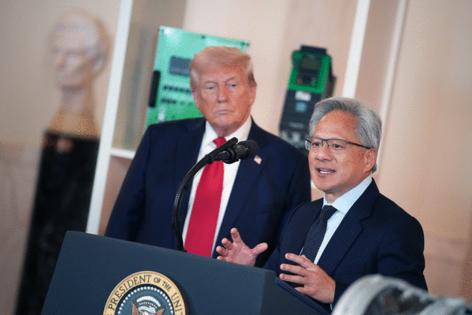Commentary: Make America capitalist again
Published in Op Eds
With the federal government now the largest shareholder of Intel, an ostensibly private company, Commerce Secretary Howard Lutnick wants you to know that “This is not socialism.” But if public ownership of the means of production isn’t socialism, what is?
With feverish speed and characteristic blunderbuss, President Donald Trump has given the federal government – and himself – unprecedented control over private economic decisions. Call it socialism, economic nationalism or any “-ism” you want. It is a threat to the profit-and-loss system at the heart of American prosperity.
Consider a few examples:
This spring, the president’s trade war shot America’s average tariff rate from 1.5% to 28%, making us the second-highest tariffed people in the world. Bond markets and courts have forced Trump to back down, but tariffs are still higher than they’ve been in decades (15% on the EU, 35% on Canada, and 50% on steel and aluminum).
His so-called deals have mostly given the president greater control over international investment. Asked about his EU deal, he blithely replied, “The details are $600 billion to invest in anything I want. Anything. I can do anything I want.”
Or take Trump’s approach to US Steel, a 124-year-old private firm that tried to sell itself to Japan’s Nippon Steel for over a year. At first, like President Biden before him, Trump wanted to block the sale. Then in June, he permitted it on the condition of extraordinary concessions to the federal government. Now, the President of the United States has a say in board membership, factory locations, capital investment, employment, worker pay and even naming rights.
In August, Trump told chip makers Nvidia and AMD that they couldn’t sell to China unless the government got a 15% cut. Next, the administration floated the idea of taxing patents. Now they want to own a part of any patent supported by government funding. The president has even stuck his nose in Coca-Cola’s sugar and Cracker Barrel’s logo.
Why should we care? Like the “communists, Marxists, fascists and the radical left thugs” he criticizes, Trump overlooks what made America’s economy great in the first place. Nor does he seem to recognize the long, disappointing history of government control over the means of production.
Americans have long enjoyed relatively free rein to produce and exchange on whatever terms they want. Economic freedom has allowed American workers and businesses to create as much value for customers as they can while expending as few resources as possible. That efficiency is exactly what a profit-and-loss system incentivizes.
It is why Americans have built 15 of the world’s 25 largest companies. We represent 4.2% of the world’s population yet produce more than 26% of global GDP. Our median income is nearly nine times the global average and our poverty rate is a fraction of the global rate.
As for socialism, the factories of the Eastern Bloc gobbled up resources, using two to three times as much steel as capitalist factories for every dollar of output produced. Managers were rewarded for ensuring that workers put in long hours but paid little attention to what those workers did.
Socialist factories churned out little of value, which is why workers earned less than a quarter of what their capitalist counterparts earned. In socialist Poland, they worked three times as long as capitalist workers to buy the same quantity of chicken, five times as long for soap, and nine times as long for a car (that typically didn’t work).
Socialism failed by avoiding the profit-and-loss test. They had no need to attend to customers’ wants because the state bought their products whether they were worthwhile or not.
Trumpism will fail for the same reason. The president kicked off his first term by negotiating a $3.6 billion gift from Wisconsin voters to Foxconn. The firm hired workers to meet the state’s employment requirements, but since it didn’t actually have much work to do, it paid 20-year-olds to watch Netflix all day.
Historically, government- privileged firms tend to be wasteful firms. When the government becomes both regulator and shareholder, it undermines the profit-and-loss test. It also blurs responsibility. If the firm profits, politicians claim credit; if it incurs losses, we taxpayers bear the burden.
Undisciplined by market competition and unable to profit by creating value for customers, socialist managers focused on pleasing politicians. Is this now our fate in the United States? At least the socialists knew what they were.
____
Matthew Mitchell is a senior fellow at the Fraser Institute and a senior affiliated scholar with the Mercatus Center. Peter Boettke is a professor of economics at George Mason University and director of the F.A. Hayek Program and BB&T Professor for the Study of Capitalism at the Mercatus Center.
_____
©2025 Tribune Content Agency, LLC.
























































Comments